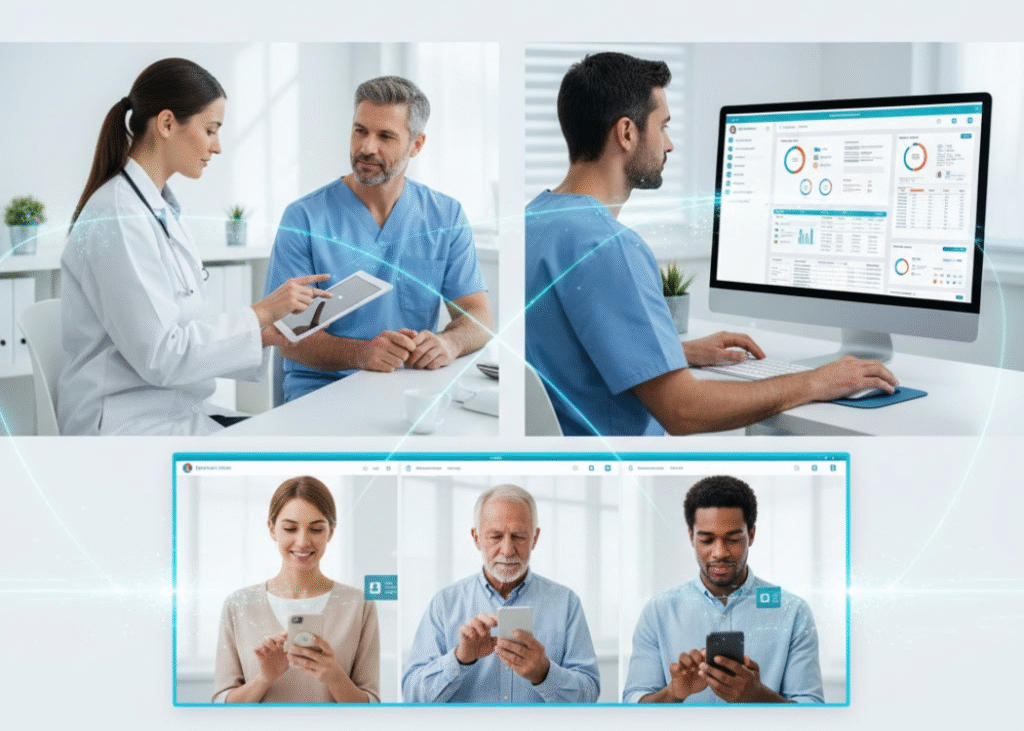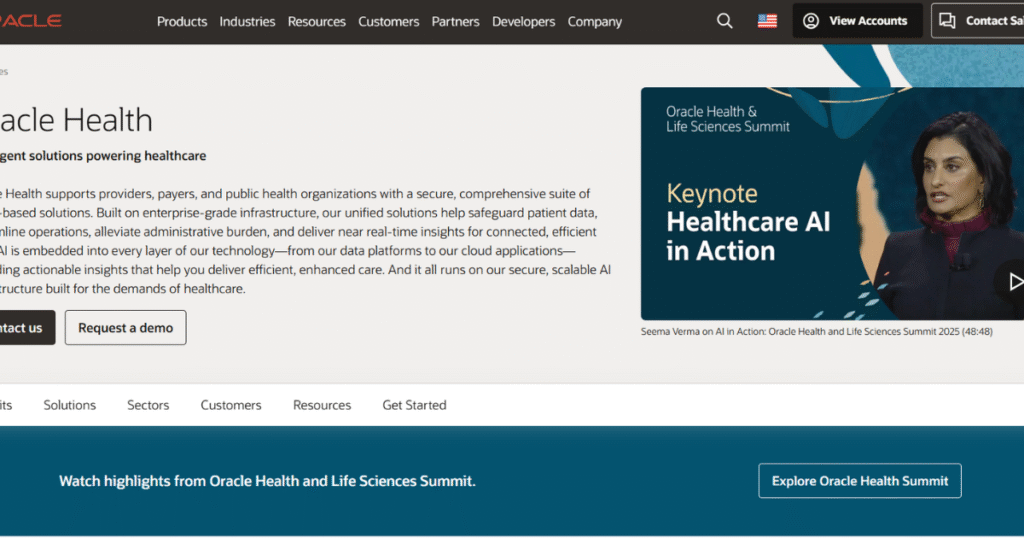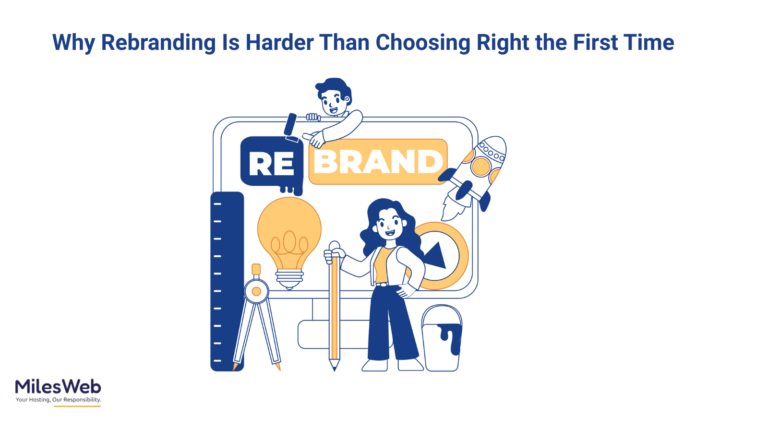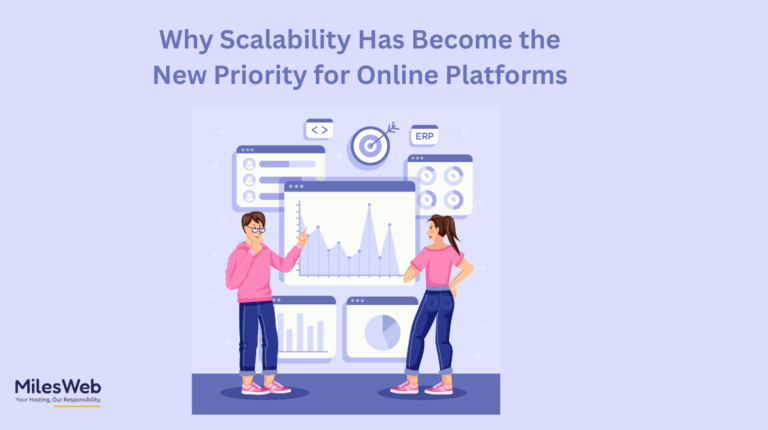In the digital age, the healthcare industry is evolving rapidly, and one of the biggest transformations is happening through Healthcare CRM software. These powerful tools are helping clinics and hospitals manage patient relationships, streamline administrative tasks, and deliver more personalized care experiences.
A Healthcare CRM (Customer Relationship Management) system allows healthcare providers to store patient data, track communication, automate appointment reminders, and integrate with EHR (Electronic Health Records) systems while maintaining HIPAA compliance and ensuring data privacy.
Whether you manage a large hospital or a small clinic, choosing the right CRM can significantly enhance patient satisfaction, operational efficiency, and overall growth. Let’s explore the top 10 healthcare CRM software solutions that are shaping the future of patient relationship management.
1. Salesforce Health Cloud
Salesforce Health Cloud is one of the most advanced and trusted healthcare CRM platforms worldwide. Built on Salesforce’s robust architecture, it offers healthcare providers a complete 360-degree view of every patient, combining medical records, social data, and engagement history to enable truly personalized care.
Key Features
- AI-driven analytics to identify high-risk patients.
- Integration with EHR systems for unified medical data.
- HIPAA-compliant security and data encryption.
- Personalized care journeys with automated follow-ups.
- Mobile access for on-the-go healthcare teams.
Why It Stands Out
Salesforce Health Cloud connects doctors, patients, and care coordinators on one platform. It’s ideal for large hospitals and healthcare organizations aiming to deliver data-driven care with predictive insights and automation.
2. Oracle Health
Oracle Health, formerly known as Cerner, combines clinical data management and CRM functionality to create a powerful healthcare ecosystem. It’s built to optimize workflows, improve patient outcomes, and offer real-time data analytics for hospital networks.
Key Features
- Predictive analytics to track patient health trends.
- Population health management for large-scale care delivery.
- Integrated dashboards for finance, operations, and clinical data.
- Cloud-based scalability and strong data protection.
Why It Stands Out
Oracle Health is designed for large hospitals and healthcare enterprises that handle extensive patient data. Its focus on data intelligence and population health makes it one of the most comprehensive healthcare CRM systems in the industry.
3. Epic Systems
Epic Systems is a pioneer in healthcare software, providing both EHR and CRM functionalities within a unified platform. It focuses on delivering connected care through interoperability and robust data sharing between healthcare providers.
Key Features
- MyChart patient portal for secure communication and scheduling.
- Predictive analytics for early diagnosis and readmission prevention.
- Seamless integration with EHR systems via HL7 and FHIR standards.
- Strong reporting and performance measurement tools.
Why It Stands Out
Epic Systems is trusted by some of the world’s largest hospitals due to its reliability, scalability, and interoperability. It provides a holistic view of patient care from admission to discharge.
4. Athenahealth
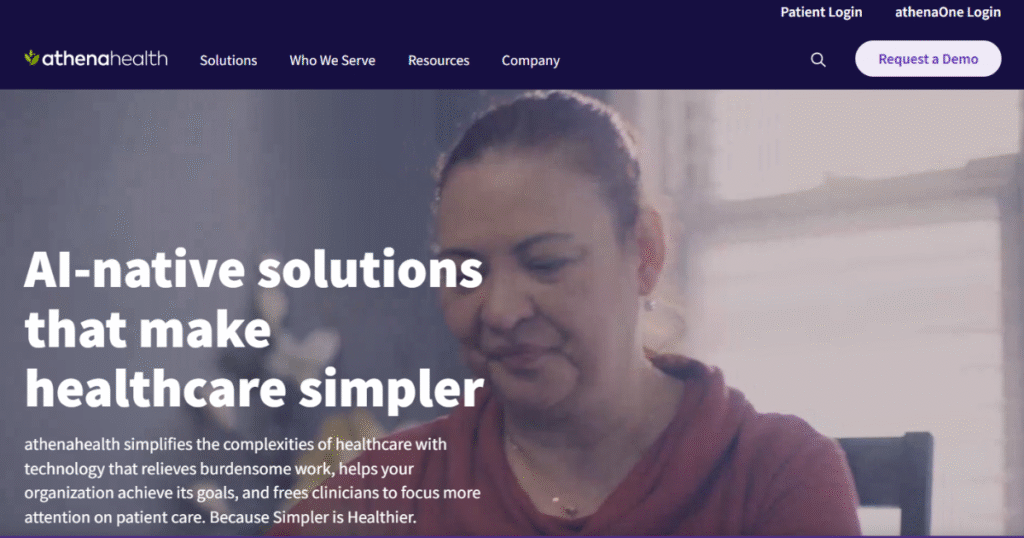
Athenahealth offers a cloud-based CRM platform that integrates seamlessly with billing, EHR, and patient communication systems. It’s tailored for outpatient clinics and medium-sized healthcare organizations that need an all-in-one solution.
Key Features
- Centralized patient data management.
- Real-time analytics for financial and clinical performance.
- Revenue cycle management with automated billing.
- Two-way patient communication and scheduling automation.
Why It Stands Out
Athenahealth is perfect for clinics that want to streamline administrative tasks and focus on patient engagement. Its cloud-first approach reduces IT dependency while maintaining efficiency and accuracy.
5. Microsoft Dynamics 365 for Healthcare
Microsoft Dynamics 365 delivers a flexible CRM solution that integrates deeply with other Microsoft tools such as Teams, Power BI, and Azure. It enables data-driven decision-making, automation, and collaboration across healthcare departments.
Key Features
- Integration with Microsoft’s cloud ecosystem.
- Workflow automation for care team coordination.
- Real-time analytics and patient segmentation.
- High-level security with compliance management.
Why It Stands Out
Dynamics 365 offers unmatched data visualization and integration capabilities. It’s a perfect fit for healthcare organizations that already rely on Microsoft tools for communication and data management.
6. Zoho CRM for Healthcare
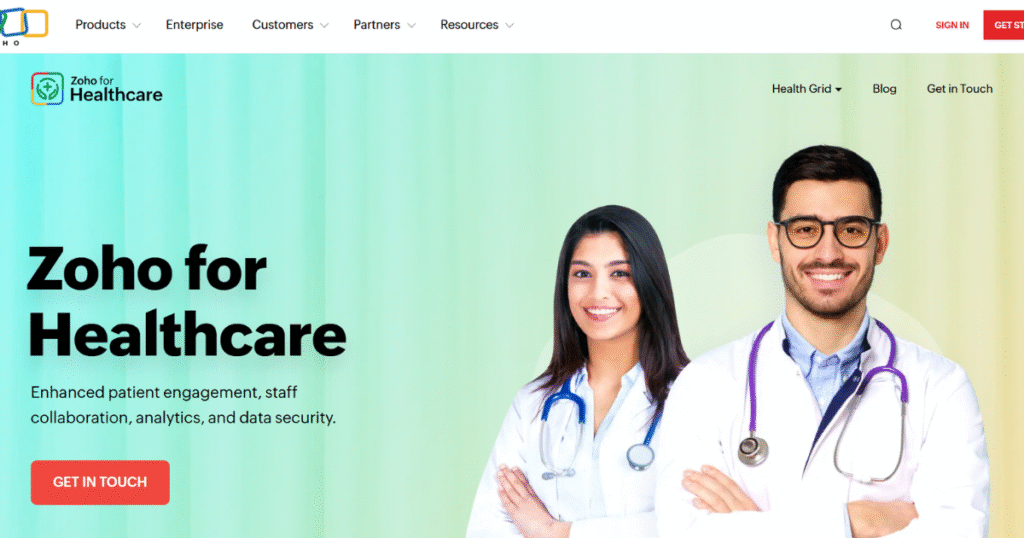
Zoho CRM is a popular, cost-effective platform for small to mid-sized healthcare providers. It focuses on automating patient engagement and simplifying workflow management while offering essential CRM capabilities with a healthcare twist.
Key Features
- HIPAA-compliant patient information storage.
- Appointment reminders and follow-up automation.
- Integration with telephony, email, and social media.
- Reports and dashboards to track patient satisfaction.
Why It Stands Out
Zoho CRM offers great value for money, making it ideal for clinics looking to transition from manual processes to digital systems. It’s simple to use, secure, and adaptable for growing practices.
7. HubSpot for Healthcare
HubSpot CRM is a marketing automation powerhouse that’s increasingly being adopted in healthcare for patient acquisition, engagement, and retention. It offers a full suite of tools for managing communication and tracking patient interactions.
Key Features
- Automated email marketing and follow-ups.
- Live chat and chatbot functionality.
- Analytics for patient engagement campaigns.
- Integration with websites and booking platforms.
Why It Stands Out
HubSpot is ideal for clinics that want to grow their patient base and improve online engagement. Its strong focus on automation and inbound marketing makes it a great tool for healthcare branding.
8. NexHealth
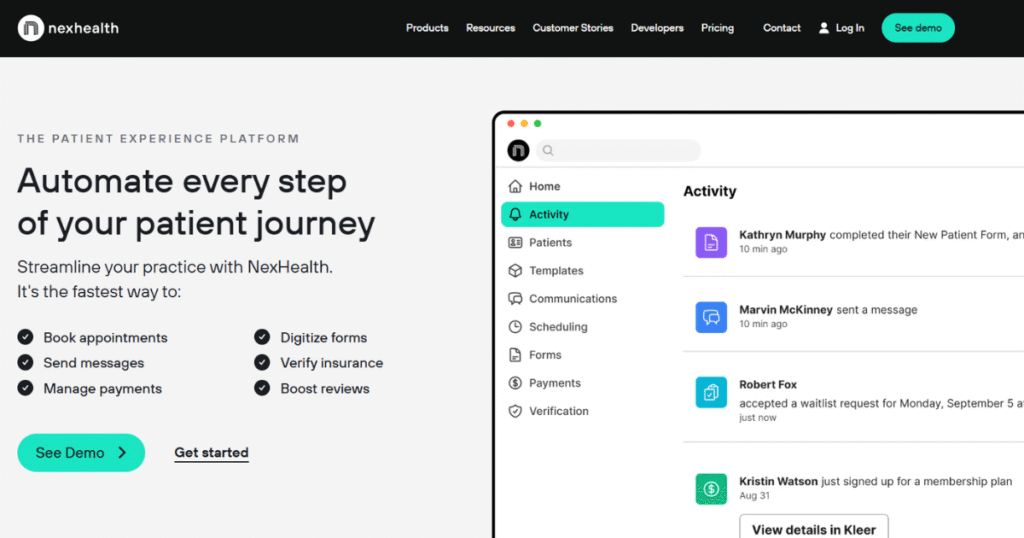
NexHealth focuses on delivering a digital-first patient experience by automating bookings, forms, payments, and communication. It bridges the gap between front-desk operations and patient interactions.
Key Features
- Online appointment scheduling and confirmation.
- Digital intake forms and secure messaging.
- Payment processing and insurance verification.
- Integration with popular EHR systems.
Why It Stands Out
NexHealth is an excellent choice for clinics that prioritize patient convenience and engagement. It reduces administrative burden while ensuring a smooth, modern experience for both patients and staff.
9. Luma Health
Luma Health is designed to improve patient communication through automated messaging, reminders, and surveys. It ensures that patients stay informed and connected throughout their care journey.
Key Features
- Smart reminders via SMS, voice, and email.
- Integration with EHR and scheduling systems.
- Feedback and review management tools.
- Automated follow-ups and recall campaigns.
Why It Stands Out
Luma Health helps reduce no-shows, increase retention, and improve overall patient satisfaction. It’s especially beneficial for multi-specialty clinics managing high appointment volumes.
10. NextGen Healthcare
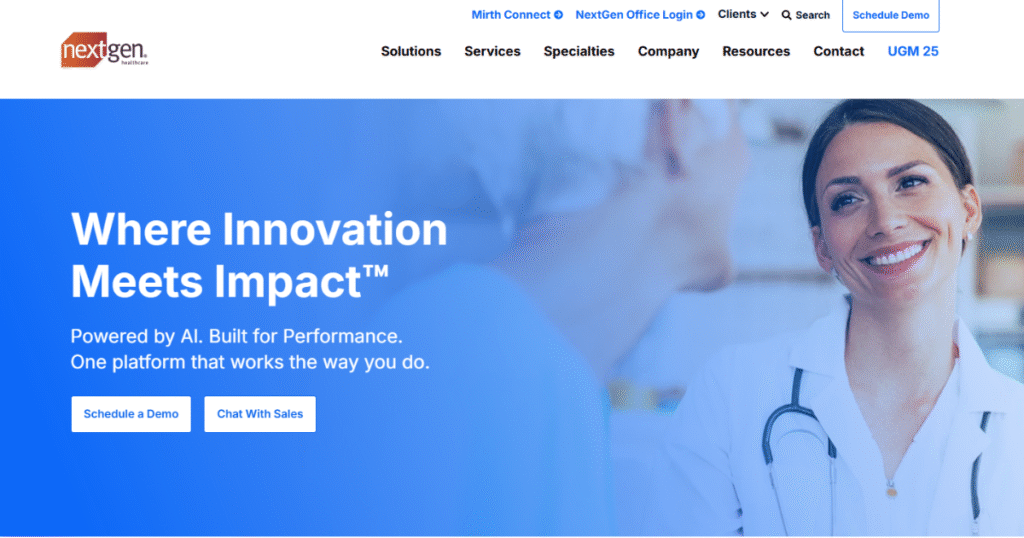
NextGen Healthcare offers an all-in-one healthcare management solution that combines CRM, EHR, and billing into a single system. It’s designed for small to medium-sized practices looking for a reliable, scalable platform.
Key Features
- Telehealth integration and virtual consultations.
- AI-powered insights for clinical decision-making.
- Patient portals with self-service options.
- End-to-end claims and billing automation.
Why It Stands Out
NextGen Healthcare balances clinical and administrative needs, helping healthcare providers save time, reduce errors, and enhance patient outcomes with real-time analytics.
Key Benefits of Healthcare CRM Software
Implementing a healthcare CRM delivers a wide range of benefits, including
- Improved Patient Engagement through personalized communication.
- Operational Efficiency with automated workflows.
- Enhanced Care Coordination between doctors, nurses, and admin staff.
- Data Security and Compliance with HIPAA standards.
- Analytics-Driven Decisions for better patient outcomes.
Challenges in CRM Implementation
While the advantages are clear, implementing a healthcare CRM can come with challenges such as
- Complex Data Migration from legacy systems.
- Training Requirements for staff adoption.
- Integration Costs with EHR and billing systems.
- Customization Needs for unique clinical workflows.
Proper onboarding, phased deployment, and continuous support ensure smooth adoption.
FAQs about Healthcare CRM Software
- What is a Healthcare CRM?
A Healthcare CRM is software that helps healthcare organizations manage relationships with patients by automating communication, storing data securely, and improving engagement. - Why do hospitals need a CRM system?
Hospitals use CRMs to streamline appointment management, automate follow-ups, manage billing, and analyze patient trends for better healthcare delivery. - Which CRM is best for large hospitals?
For large hospitals, Salesforce Health Cloud, Epic Systems, and Oracle Health are highly recommended due to their scalability and integration capabilities. - What are the best CRM options for small clinics?
Smaller clinics often prefer Zoho CRM, NexHealth, or HubSpot, as they’re affordable, easy to set up, and efficient for managing limited patient volumes. - Are Healthcare CRMs HIPAA compliant?
Yes, most leading CRMs such as Salesforce Health Cloud, Athenahealth, and Zoho CRM are HIPAA-compliant, ensuring data security and patient privacy. - Can CRM integrate with EHR systems?
Yes, top CRMs integrate seamlessly with EHRs to provide unified patient records and improve communication between departments. - How does CRM software enhance patient satisfaction?
By sending automated reminders, personalized updates, and secure communication, CRM systems keep patients engaged and informed, boosting overall satisfaction.
Conclusion
Choosing the right Healthcare CRM software can redefine how your clinic or hospital interacts with patients. From automating everyday tasks to offering predictive insights, CRMs have become essential tools in modern healthcare management.
For small practices, affordable and easy-to-use platforms like Zoho CRM, HubSpot, and NexHealth provide great value.
For larger healthcare systems, robust enterprise solutions like Salesforce Health Cloud, Oracle Health, and Epic Systems deliver deeper insights and scalability.
The best healthcare CRM is one that aligns with your organization’s size, patient volume, and long-term vision, helping you create a more efficient, connected, and patient-focused future.


